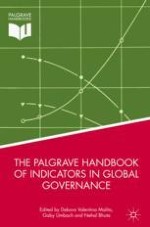2018 | OriginalPaper | Buchkapitel
19. Analysing the Use of Sustainability Indicators
verfasst von : Stephen Morse
Erschienen in: The Palgrave Handbook of Indicators in Global Governance
Aktivieren Sie unsere intelligente Suche, um passende Fachinhalte oder Patente zu finden.
Wählen Sie Textabschnitte aus um mit Künstlicher Intelligenz passenden Patente zu finden. powered by
Markieren Sie Textabschnitte, um KI-gestützt weitere passende Inhalte zu finden. powered by
